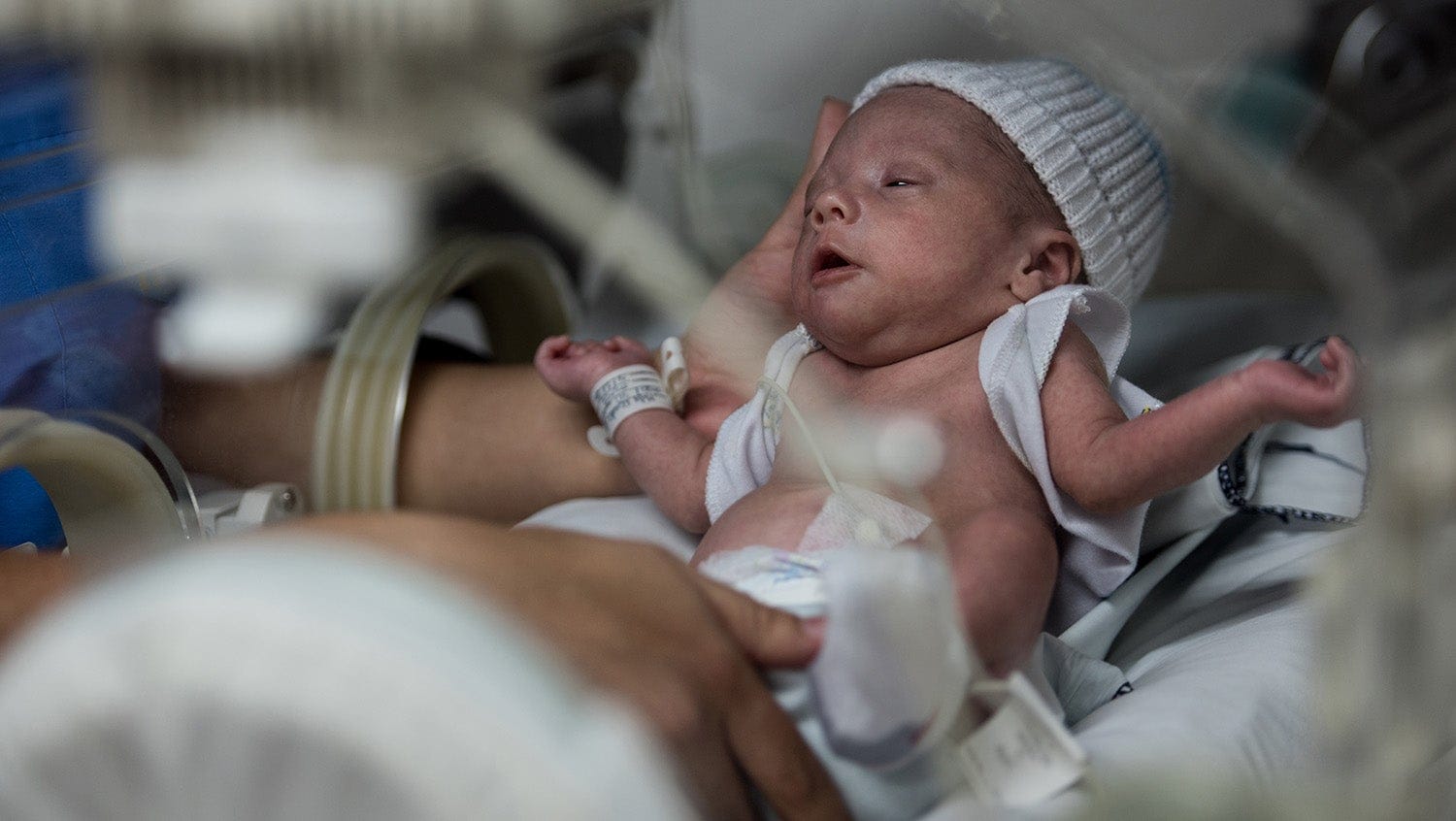
Getty Images
A neonatologist argues that social needs screening and referral, which has grown more popular in outpatient clinics, is necessary in the neonatal intensive care unit, as well.
Close to half of children in the United States live at or near the poverty level. Study after study has shown that poverty can have life-long negative impacts, including physical and developmental delays in children and fair or poor health outcomes for caregivers.
The American Academy of Pediatrics issued a policy statement in 2016 about the importance of addressing issues related to poverty while seeing patients and families in a healthcare setting. Many hospitals and healthcare systems have made strides in addressing these needs by screening patients and families for housing and job or food insecurity and by asking if they need assistance with transportation or affording medications. This process typically occurs in outpatient primary care visits, and it can help identify unmet needs that interfere with patients’ ability to pursue better health.
However, a new JAMA Pediatrics viewpoint titled “Addressing Childhood Poverty in Pediatric Clinical Settings: The Neonatal Intensive Care Unit Is a Missed Opportunity” sheds light on the importance of expanding that model into the neonatal intensive care unit (NICU). Preterm infants represent a high-risk, vulnerable population, and the extended period of time they typically spend in the NICU provides an untapped opportunity, the authors say, to address housing and food insecurity as well as childcare- and employment-related issues with families.
The complex health issues that any preterm infant may face, including social, developmental, and behavioral health problems, are exacerbated for children and families living in poverty. Margaret Parker, MD, a neonatologist at Boston Medical Center (BMC) and lead author of the viewpoint, spoke with HealthCity about the importance of the NICU provider in addressing poverty and other social determinants of health.
HealthCity: What makes the NICU an important place to address poverty and other social determinants of health?
Meg Parker, MD: Ten percent of births in the U.S. are preterm, and studies have shown that premature births disproportionately affect low-income and Black women. Women who can’t access healthcare during pregnancy, or who get care late in their pregnancy, are more likely to deliver prematurely. Having an infant in the NICU is an acute, unanticipated stressor for families, and for those who are close to falling behind on rent or who can’t afford enough food, it can be an incredibly difficult time. Many parents of our NICU infants are not always able to be with them in the NICU because of job commitments or childcare cost issues. However, we know that having parents with their babies in the NICU is critical for the short- and long-term health and developmental outcomes for preterm infants. If we can help families navigate these challenges so that they can be more present at the bedside, we have an opportunity to change the trajectory of that child’s health, as well as improve the health of the family.
“We can help these families achieve a more equitable situation”
We need to provide universal access to services such as childcare support, food delivery, transportation, and parking assistance for parents of infants in the NICU. This would help reduce the stress and anxiety around accessing basic needs, allowing for more parental presence with the infant, increased breastfeeding opportunities, and skin to skin contact, which have been associated with improved health and developmental outcomes for preterm infants.
HC: How can providers identify and address poverty for caregivers of infants in the NICU?
MP: It’s imperative that we look beyond the short term to what we can do for these families in the long term to help them thrive. In the outpatient setting at BMC, providers began to use a screening tool (THRIVE) for patients to self-identify their unmet social needs and to tell us where they’d like our help to address these issues — we are just starting the process of expanding this model into the NICU so that we, as their healthcare providers, have a comprehensive assessment of the family situation.
Insight into what they see as their biggest challenges will allow for us to connect them with resources that can address their needs in a timely manner. Whether the resources are local to BMC, such as our food pantry, or at a community organization that can provide child or elder care support, we can help these families achieve a more equitable situation. This process can be performed at other hospitals, too.
HC: The benefits of these services seem well defined — what’s keeping NICUs from implementing social needs assistance today?
MP: One of the issues is the mindset of NICU providers. For a long time, many NICU providers have felt, and still feel, that their primary role is to optimize acute medical care and that issues like food, employment, and housing instability may be best left to social workers or outpatient providers. The problem with that line of thinking is that many at-risk families spend weeks to months in the NICU, and precious time is lost in connecting families with resources if it does not occur during the NICU stay. Further, hospital social workers have a huge array of needs to attend to, and a team approach to systematically identifying and addressing social needs may be more effective.
Another challenge is that many NICUs, which provide highly specialized services by nature, serve a wide, geographic area of patients. This means that NICUs may potentially need to prepare for delivery of referrals across a large geographic area.
HC: If poor access to prenatal care is a risk factor for preterm delivery, is it a fair argument that NICU-based intervention is too late? How can the NICU-based model you propose fit into the bigger picture of improving health equity?
MP: Ideally, identifying and addressing social determinants of health should occur across the continuum of care delivery — during the prenatal period, birth hospitalization, and post-discharge — to optimize the health and well-being of children. The NICU simply represents one spoke in a large wheel, whose potential is not being maximized. Ultimately, a multifaceted effort to promote health equity both via the healthcare delivery system and in the community is needed to move the needle on the negative health consequences of child poverty.


